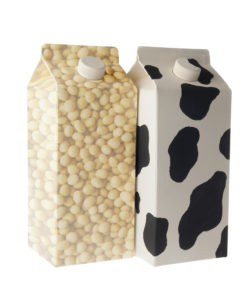
By: Brent E. Johnson
On October 12, 539 BC, Persian ruler Cyrus the Great conquered Babylon. According to the Biblical Book of Daniel, on the night before the overthrow, the Babylonian king, Belshazzar, witnessed the appearance of a mysterious hand, which wrote on a palace wall, “Mene, Mene, Tekel, Upharsin.” Belshazzar called for Daniel to interpret the mysterious inscription. Daniel’s translation: “You have been weighed . . . and found wanting.” Is the same writing on the wall for Prop 65?
First came “Roundup.” As we’ve blogged about in the recent past, Monsanto, the manufacturer of the herbicide Roundup, filed a petition in Fresno County Superior Court to prevent the California Office of Environmental Health Hazard Assessment (“OEHHA”) from listing glyphosate (the principle ingredient in Roundup) as a Prop 65 chemical requiring a warning label. Finding no success, Monsanto and several state agricultural associations moved to federal court seeking an order that they are not required to put a warning label on Roundup or food products containing glyphosate. While the federal case is ongoing, the court granted a preliminary injunction so that no warning is required during the pendency of the action. The federal court gave particular credence to Monsanto’s first amendment argument that it was being required to engage in commercial speech with which it did not agree. The court held that the State of California may only require commercial speakers to disclose “purely factual and uncontroversial information,” and the science before it was questionable regarding whether glyphosate is a carcinogen. In 2015, the International Agency for Research on Cancer (“IARC”) – a division of the World Health Organization — issued a report finding that glyphosate is a “probable carcinogen.” More recently, however, the Environmental Protection Agency issued a draft human health risk assessment that concluded that glyphosate is likely not carcinogenic. The federal case will put on trial the science behind OEHHA’s glyphosate listing, which is predicated exclusively on the IARC study.
After Roundup came coffee. As we’ve blogged about recently, in response to a ruling by the Los Angeles Superior Court that coffee must bear a Prop 65 cancer and reproductive harm warning, OEHHA announced, and opened a period for public comment on, a proposed regulation that would eliminate the need for cancer warnings on coffee products. OEHHA’s reasoning is illuminating: “In a review of more than 1,000 studies published this week, the World Health Organization’s International Agency for Research on Cancer (IARC) concluded that there is ‘inadequate evidence’ that drinking coffee causes cancer. IARC found that coffee is associated with reduced risk for cancers of the liver and uterus, and does not cause cancers of the breast, pancreas and prostate. IARC also found that coffee “exhibits strong antioxidant effects related to reduced cancer risk.” It seems that OEHHA is willing to look at coffee in its entirety — even though the Los Angeles Superior Court opinion and Prop 65, itself, focuses on the chemical alone. See Council for Education and Research on Toxics v. Starbucks Corp. et al., No. BC435759 (Cal. Super. Ct. L.A. County March 28, 2018)
And just this week, the California Court of Appeal (Second Appellate Division) ruled that breakfast cereal manufactures are not required to label their boxes with Prop 65 warnings based on the presence of acrylamide because federal law pre-empts Prop 65 when it comes to Fruity Pebbles. Post Foods, LLC v. Superior Court, No. B284057, 2018 WL 3424800, at *6 (Cal. Ct. App. July 16, 2018). The Court held that mandating a Prop 65 warning on cereals presented an “obstacle” to the Food and Drug Administration’s stated objective of encouraging the consumption of whole grains.
For those of us who practice in the food and beverage space, a finding of federal pre-emption of a state statute or regulation is the Holy Grail. In this case, the Court of Appeal found “obstacle pre-emption” by citing to correspondence between FDA and OEHHA in the early and mid-2000s regarding the application of Prop 65 to food, in general, and acrylamide, in particular. Specifically, in a July 14, 2003 letter from FDA Deputy Commissioner Lester Crawford to Joan Denton, Director of OEHHA, Commissioner Crawford stated:
“FDA is concerned that premature labeling of many foods with warnings about dangerous levels of acrylamide would confuse and could potentially mislead consumers, both because the labeling would be so broad as to be meaningless and because the risk of consumption of acrylamide in food is not yet clear. [¶] Furthermore, consumers may be misled into thinking that acrylamide is only a hazard in store-bought food. In fact, consumer exposure may be greater through home cooking. … In addition, a requirement for warning labels on food might deter consumers from eating foods with such labels. Consumers who avoid eating some of these foods, such as breads and cereals, may encounter greater risks because they would have less fiber and other beneficial nutrients in their diets. For these reasons, premature labeling requirements would conflict with FDA’s ongoing efforts to provide consumers with effective scientifically based risk communication to prevent disease and promote health.”
Post Foods, 2018 WL 3424800, at *2.
FDA’s letter should be read for what it is – a scathing indictment of Prop 65 as it pertains to food. FDA essentially told OEHHA: (1) Your Prop 65 labeling is so ubiquitous as to be “meaningless;” (2) Your science regarding acrylamide is suspect; and (3) Your labeling requirement is actually counterproductive because, to the extent consumers read the warnings, the labels might actually deter them from eating healthy foods, such as whole grains. FDA followed up with OEHHA in 2006 reaffirming its earlier position and observing that an acrylamide warning on food might “create unnecessary and unjustified public alarm about the safety of the food supply; dilute overall messages about healthy eating; and mislead consumers into thinking that acrylamide is only a hazard in store-bought food.”
These recent developments go to the core of several long-standing criticisms of Prop 65: (1) The science behind requiring a warning – in most cases, a study by IARC – is dubious; (2) The warning requirement is myopically focused on the presence of the accused chemical and does not take into account broader considerations of the value of the product as a whole or the actual risk posed by the presence of the chemical in the product; and (3) The “over-warning” engendered by Prop 65 dilutes the impact of consumer product warnings that are actually important. While Prop 65 apologists often resort to the argument that the law is “just a warning statute — it doesn’t ban products,” this argument glosses over the fundamental issue of what the warning actually means. Do the words “known to the State of California” mean that hard science supports the cancer or reproductive harm warning? Does the very presence of the chemical in the product actually increase the risk of cancer or reproductive harm to the consumer who uses it or consumes it? Does the product have benefits that outweigh any risks from exposure to the chemical?
These criticisms of Prop 65 finally have been heard by Congress, a group that was more than happy to legislate away Vermont’s GMO law, but heretofore has been disinclined to take on California. On June 18, 2018, a bipartisan group of congressmen introduced H.R. 6022 (“The Accurate Labels Act”), a bill “[t]o amend the Fair Packaging and Labeling Act to require that Federal and State mandated information declarations and labeling requirements applicable to the chemical composition of . . . consumer products meet minimum scientific standards to deliver accurate and clear information . . . .” Among the bill’s sponsors is Representative Jim Costa, a Democrat from California’s 16th Congressional District in the central San Joaquin Valley. The bill prohibits departments and agencies of the federal government as well as states and political subdivision of states from requiring information — including warnings — on consumer commodities unless, among other things, the information/warning is: (1) risk-based; (2) based on the best available science; and (3) based on an appropriate weight of the evidence review. Therefore, to the extent a Prop 65 chemical listing is based on the mere presence of the chemical in a product (i.e., not based on the risk of a particular exposure); is made purely because a single health organization (read, IARC) has determined that the chemical may be a carcinogen or reproductive toxicant; or does not weigh the risk/benefits of the chemical in particular products, the listing would run afoul of H.R. 6022. The bill also authorizes “[a]ny . . . person that is . . . required to display or communicate to a consumer covered information about a covered product, or is, or may be, subject to an enforcement action with respect to that requirement by a State or a political subdivision of a State, [to] bring a civil action in an appropriate district court of the United States against that State (or any private entity that is authorized to bring an enforcement action on behalf of that State) . . . if the requirement of the State or political subdivision does not comply with the requirements [of this Act].” If the bill becomes law, Bounty Hunters in California may find themselves the subject of federal lawsuits for making Prop 65 claims.
H.R. 6022 has been referred to the House Committee on Energy and Commerce. An analogous Senate bill, S 3109, is before the Committee on Commerce, Science and Transportation. While these bills will have a difficult time making it out of committee because of timing issues and the likelihood of opposition from other California legislators in both houses, their very existence shows that Congress is paying attention. When coupled with the recent Roundup and acrylamide decisions, the House and Senate bills – like the mysterious inscription given to Belshazzar – may be the writing on the wall for Prop 65?

